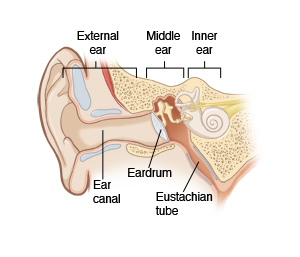Earache Without Infection (Child)

Earaches can happen without an infection. This can occur when air and fluid build up behind the eardrum, causing pain and reduced hearing. This is called serous otitis media. It means fluid in the middle ear. It can happen when your child has a cold and congestion blocks the passage that drains the middle ear (eustachian tube). It may occur after a middle ear infection caused by bacteria. Or it may sometimes happen with nasal allergies. The earache may come and go. Your child may also hear clicking or popping sounds when chewing or swallowing.
It may take several weeks to 3 months for the fluid to go away on its own. Oral pain relievers and ear drops help with pain. Ask your child's healthcare provider which medicines are safe for your child. Decongestants and antihistamines can be used, but they don’t always help. Nasal steroid sprays may sometimes be prescribed. No infection is currently present, so antibiotics will not help. This condition can sometimes become an ear infection, so let the healthcare provider know if your child develops a fever or drainage from the ear or if symptoms get worse.
If your child doesn't get better after 3 months, they may need surgery to drain the fluid and insert ear tubes (tympanostomy). Your child may also need the tubes if they are at risk for speech, language, or learning problems. Or your child may need the ear tubes if they have hearing loss.
Home care
Your child's healthcare provider may have you keep an eye on your child (watchful waiting) for up to 3 months. This means letting the provider know if your child's symptoms don't get better or get worse.
Follow-up care
Follow up with your child’s healthcare provider as directed. It's important to make sure the fluid goes away in the future.
When to seek medical advice
Call your child's healthcare provider or seek medical care right away if any of these occur:
-
Your child has a fever of 100.4°F (38°C) or higher, or as directed by your provider
-
Ear pain gets worse
-
Discharge, blood, or foul odor from ear
-
Unusual decreased activity or fussiness
-
-
Fluid or blood draining from the ear
Call 911
Call 911 if any of the following occur:
Online Medical Reviewer:
Ashutosh Kacker MD
Online Medical Reviewer:
Rita Sather RN
Online Medical Reviewer:
Tara Novick BSN MSN
Date Last Reviewed:
12/1/2022
© 2000-2025 The StayWell Company, LLC. All rights reserved. This information is not intended as a substitute for professional medical care. Always follow your healthcare professional's instructions.